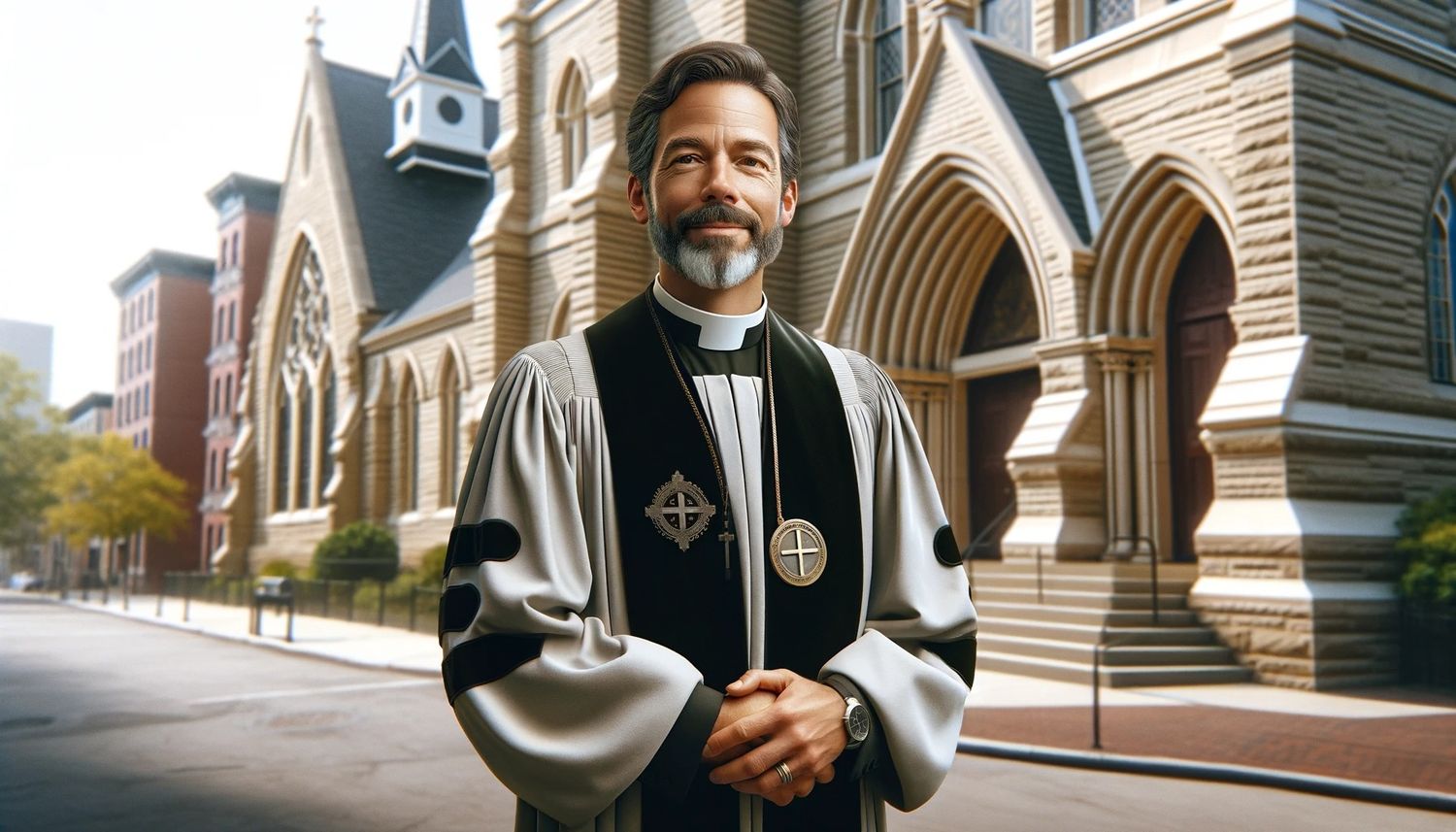Home>Theology and Spirituality>How To Call A Pastor In A Baptist Church


Theology and Spirituality
How To Call A Pastor In A Baptist Church
Published: February 21, 2024
Ericka Andersen, an editor at Christian.net, expertly merges digital strategy with content creation, focusing on faith and societal issues. Her communication skills enhance the platform's engaging narratives, fostering meaningful dialogue on belief's impact on society.
Learn the step-by-step process of calling a pastor in a Baptist church. Explore the theology and spirituality behind this important decision.
(Many of the links in this article redirect to a specific reviewed product. Your purchase of these products through affiliate links helps to generate commission for Christian.net, at no extra cost. Learn more)
Table of Contents
Introduction
Calling a pastor in a Baptist church is a significant and sacred process that involves careful consideration, prayerful discernment, and a deep understanding of the responsibilities and expectations associated with the role. The selection of a pastor is a pivotal moment in the life of a church, as the individual chosen will be entrusted with the spiritual leadership, guidance, and pastoral care of the congregation.
In the Baptist tradition, the role of a pastor is multifaceted, encompassing not only the preaching of sermons and the administration of sacraments but also the provision of spiritual counsel, support, and nurturing to the members of the church community. The pastor serves as a shepherd, guiding the flock with wisdom, compassion, and a steadfast commitment to the teachings of the Christian faith.
The process of calling a pastor is rooted in the belief that God's guidance and wisdom are essential in discerning the right individual to lead and serve the church. It is a collaborative effort that involves the active participation of the congregation, the deacons, and a search committee, all working together to seek out and discern the person whom they believe is called by God to shepherd and minister to the church.
Throughout this article, we will delve into the intricate process of calling a pastor in a Baptist church, exploring the steps involved, the responsibilities of the search committee, and the crucial considerations that shape the decision-making process. By gaining a deeper understanding of this process, we can appreciate the reverence and significance attached to the calling of a pastor, and the profound impact it has on the spiritual life and well-being of the church community.
Read more: How To Select A Pastor For A Baptist Church
Understanding the Role of a Pastor in a Baptist Church
The role of a pastor in a Baptist church is deeply rooted in the principles of servant leadership, pastoral care, and the proclamation of the Gospel. A pastor is not merely a figurehead or administrator but a spiritual shepherd who embodies the teachings of Jesus Christ and provides guidance, support, and nurturing to the congregation. In the Baptist tradition, the pastor is regarded as a spiritual overseer, responsible for shepherding the flock with humility, compassion, and unwavering faith.
One of the primary responsibilities of a pastor is the preaching and teaching of the Word of God. This involves delivering sermons that are grounded in biblical truth, relevant to the lives of the congregation, and inspiring in their message. The pastor is tasked with expounding upon the Scriptures, offering spiritual insight, and equipping the church community with the knowledge and understanding of God's Word.
In addition to preaching, the pastor plays a crucial role in the administration of sacraments, such as baptism and the Lord's Supper. These sacred rituals are central to the life of the church, and the pastor is entrusted with ensuring their proper observance and significance within the faith community.
Furthermore, the pastor is called to provide pastoral care and support to the members of the congregation. This involves offering spiritual guidance, counseling, and comfort to those in need, as well as celebrating with them in times of joy and triumph. The pastor serves as a source of strength and encouragement, walking alongside the church community in their spiritual journeys and life experiences.
Beyond these responsibilities, the pastor is often involved in the overall leadership and direction of the church. This may include working with the deacons and church leadership to make decisions that impact the congregation, providing vision and direction for the church's mission and ministry, and fostering a sense of unity and fellowship among the members.
In essence, the role of a pastor in a Baptist church is multifaceted, encompassing spiritual leadership, pastoral care, teaching, and administration. It is a calling that demands humility, wisdom, and a deep commitment to serving the needs of the church community. As such, the process of calling a pastor is undertaken with great care and discernment, recognizing the profound impact that the right individual can have on the spiritual life and well-being of the congregation.
Steps to Calling a Pastor
-
Prayerful Consideration: The process of calling a pastor begins with prayerful consideration and discernment within the church community. The congregation, along with the deacons and church leadership, engage in heartfelt prayer, seeking God's guidance in identifying the qualities and attributes they believe are essential in a pastor. This initial step sets the tone for the entire process, emphasizing the reliance on divine wisdom and discernment.
-
Formation of a Search Committee: A search committee is typically formed to oversee the process of calling a pastor. This committee is composed of dedicated members of the congregation who are committed to the task of seeking out and evaluating potential candidates. The committee's composition often reflects the diversity of the church community, ensuring a broad representation of perspectives and insights.
-
Assessment of Church Needs and Vision: The search committee collaborates with the congregation to assess the specific needs, aspirations, and vision of the church. This involves conducting surveys, holding discussions, and seeking input from the members to gain a comprehensive understanding of the qualities and skills they desire in a pastor. The committee aligns these insights with the church's mission and vision, ensuring that the pastor called will be well-suited to lead and nurture the congregation in fulfilling its spiritual goals.
-
Candidate Search and Evaluation: The search committee embarks on the task of identifying potential candidates for the pastoral position. This may involve reaching out to denominational networks, seminaries, and other churches, as well as considering internal candidates within the congregation. Each potential candidate is carefully evaluated based on their theological alignment, pastoral experience, leadership qualities, and compatibility with the church's ethos and values.
-
Interview Process: Upon identifying promising candidates, the search committee conducts thorough interviews to gain deeper insights into their calling, beliefs, vision for ministry, and compatibility with the church community. These interviews provide an opportunity for the candidates to share their experiences, theological perspectives, and approach to pastoral ministry, allowing the committee to assess their suitability for the role.
-
Congregational Engagement and Discernment: Throughout the process, the congregation is actively engaged through forums, Q&A sessions, and opportunities to interact with the candidates. This engagement allows the members to discern the spiritual calling and suitability of the candidates, fostering a sense of ownership and unity in the decision-making process.
-
Final Decision and Call: After prayerful deliberation and discernment, the search committee, in collaboration with the congregation, makes a final decision regarding the candidate they believe is called to serve as the pastor. This decision is accompanied by a formal call extended to the chosen candidate, expressing the church's affirmation of their calling to shepherd and lead the congregation.
The steps to calling a pastor in a Baptist church reflect a deliberate and prayerful process, guided by the conviction that the calling of a pastor is a sacred undertaking that shapes the spiritual journey of the church community.
Responsibilities of the Search Committee
The search committee in a Baptist church plays a pivotal role in the process of calling a pastor, shouldering significant responsibilities that contribute to the discernment and selection of the individual who will assume the pastoral leadership of the congregation. The following are the key responsibilities of the search committee:
-
Prayerful Discernment: The search committee engages in fervent prayer, seeking divine guidance and wisdom as they embark on the task of identifying and evaluating potential candidates. This spiritual foundation underscores the committee's reliance on God's leading throughout the entire process.
-
Comprehensive Candidate Evaluation: The committee is tasked with conducting a thorough evaluation of potential candidates, considering factors such as theological alignment, pastoral experience, leadership qualities, and compatibility with the church's mission and vision. This involves reviewing resumes, conducting background checks, and seeking references to gain a comprehensive understanding of each candidate's qualifications and suitability for the pastoral role.
-
Alignment with Church Vision: The search committee collaborates with the congregation to ensure that the candidates under consideration align with the church's vision, values, and aspirations. This involves assessing how each candidate's skills, experiences, and theological perspectives resonate with the specific needs and spiritual direction of the church community.
-
Transparent Communication: The committee maintains open and transparent communication with the congregation throughout the process, providing regular updates, soliciting feedback, and fostering a sense of inclusivity and ownership among the members. Clear and honest communication ensures that the congregation is informed and engaged in the discernment process.
-
Interview Coordination and Evaluation: The search committee organizes and conducts interviews with potential candidates, providing a platform for in-depth discussions and assessments. These interviews serve as a means to delve into the candidates' calling, beliefs, vision for ministry, and compatibility with the church community, enabling the committee to gain valuable insights into their character and suitability for the pastoral role.
-
Discernment and Decision-making: The committee leads the congregation in the discernment process, facilitating opportunities for congregational engagement, feedback, and discernment. Through forums, Q&A sessions, and congregational meetings, the committee ensures that the members have a voice in the decision-making process, fostering a sense of unity and shared ownership in the selection of the pastor.
-
Extending the Call: Upon reaching a collective decision, the search committee extends a formal call to the chosen candidate, expressing the church's affirmation of their calling to shepherd and lead the congregation. This pivotal moment marks the culmination of the committee's responsibilities, as they convey the congregation's trust and confidence in the selected pastor.
The responsibilities of the search committee underscore the gravity of their role in calling a pastor, emphasizing the need for discernment, transparency, and alignment with the church's spiritual vision. Through their dedicated efforts, the search committee serves as stewards of the congregation's spiritual well-being, ensuring that the pastor called is equipped to lead, nurture, and minister to the church community with wisdom and grace.
Conducting Interviews and Making a Decision
The process of calling a pastor in a Baptist church reaches a critical juncture during the phase of conducting interviews and making a decision. This pivotal stage involves deliberate and prayerful discernment, as the search committee engages in in-depth conversations with potential candidates, seeking to gain profound insights into their calling, character, and alignment with the church's vision and values.
The interviews serve as a platform for the search committee to delve into the theological perspectives, pastoral experiences, and leadership qualities of the candidates. These interactions provide a valuable opportunity to assess the candidates' ability to articulate their faith, communicate their vision for ministry, and demonstrate a deep understanding of the spiritual needs and aspirations of the church community.
During the interviews, the search committee seeks to discern not only the candidates' qualifications and competencies but also their spiritual calling and character. They explore the candidates' approach to pastoral care, their capacity to provide spiritual guidance and support, and their commitment to shepherding the congregation with humility, compassion, and unwavering faith.
In addition to the search committee's assessments, the congregation is often provided with opportunities to engage with the candidates, asking questions, sharing their perspectives, and discerning the spiritual resonance and compatibility with the pastoral hopefuls. This congregational engagement fosters a sense of ownership and unity, allowing the members to participate in the discernment process and affirm the individual they believe is called to serve as their pastor.
Following the interviews, the search committee, in collaboration with the congregation, engages in prayerful reflection and deliberation. They consider the insights gleaned from the interviews, the feedback from the congregation, and the alignment of the candidates with the church's vision and mission. This collective discernment process is characterized by a deep sense of reverence, humility, and reliance on God's guidance, as the committee and the congregation seek to discern the individual whom they believe is called to shepherd and lead the church.
Ultimately, the culmination of this discernment process leads to a collective decision regarding the candidate who will be extended the call to serve as the pastor. This decision is marked by a profound sense of affirmation, unity, and trust, as the search committee and the congregation unite in their conviction that the chosen candidate embodies the qualities, calling, and spiritual leadership essential to guide and nurture the church community.
The phase of conducting interviews and making a decision represents a sacred and transformative journey, guided by prayer, discernment, and a deep commitment to seeking God's will in the calling of a pastor. It is a testament to the reverence and significance attached to this process, as the church community collectively discerns the individual who will assume the vital role of spiritual shepherd and leader within the congregation.
Read more: What Is A Lutheran Pastor Called
Extending the Call to the Chosen Pastor
After a meticulous and prayerful discernment process, the pivotal moment arrives when the search committee, in collaboration with the congregation, extends the call to the chosen pastor. This significant step marks the culmination of the collective discernment and affirms the individual whom the church community believes is called by God to shepherd and lead them in their spiritual journey.
The act of extending the call is imbued with profound reverence and significance, reflecting the deep sense of trust, affirmation, and spiritual resonance that the congregation and the search committee have found in the selected candidate. It is a moment of celebration, as the church community unites in their conviction that the chosen pastor embodies the qualities, calling, and spiritual leadership essential to guide and nurture them.
The process of extending the call is characterized by a formal and heartfelt invitation, expressing the church's affirmation of the chosen pastor's calling to serve the congregation. This invitation is often conveyed through a formal letter, personally delivered by the search committee or church leadership, symbolizing the sincerity and gravity of the church's decision.
The call extends beyond a mere offer of employment; it is a sacred covenant, a mutual commitment between the pastor and the congregation. It signifies the church's trust and confidence in the pastor's ability to provide spiritual guidance, pastoral care, and leadership, while the pastor, in turn, commits to shepherding the congregation with humility, compassion, and unwavering faith.
Upon receiving the call, the chosen pastor enters into a period of prayerful consideration, seeking God's guidance and wisdom in discerning the path set before them. This reflective period allows the pastor to engage in discernment, seeking assurance and confirmation of their calling to the specific church community.
The act of extending the call is not merely a formality but a sacred and transformative moment, marking the beginning of a profound partnership between the pastor and the congregation. It is a testament to the faith, unity, and spiritual discernment that have guided the church community in identifying the individual whom they believe is called to lead them in their spiritual journey.
In essence, the extension of the call to the chosen pastor is a sacred and joyous occasion, embodying the collective faith, discernment, and affirmation of the church community as they embark on a new chapter of spiritual growth, guidance, and fellowship under the leadership of their shepherd.
Conclusion
The process of calling a pastor in a Baptist church is a profound and sacred journey that embodies the collective discernment, prayerful consideration, and spiritual resonance of the church community. It is a testament to the reverence and significance attached to the calling of a pastor, reflecting the deep commitment to seeking God's guidance and wisdom in identifying the individual who will assume the vital role of spiritual shepherd and leader within the congregation.
Throughout this intricate process, the search committee, in collaboration with the congregation, engages in deliberate discernment, transparent communication, and prayerful reflection. The responsibilities shouldered by the search committee underscore the gravity of their role as stewards of the congregation's spiritual well-being, ensuring that the pastor called is equipped to lead, nurture, and minister to the church community with wisdom and grace.
The steps to calling a pastor, from prayerful consideration to extending the call, reflect a deliberate and prayerful process, guided by the conviction that the calling of a pastor is a sacred undertaking that shapes the spiritual journey of the church community. The interviews and decision-making phase represent a transformative journey, guided by prayer, discernment, and a deep commitment to seeking God's will in the calling of a pastor.
The extension of the call to the chosen pastor is a sacred and joyous occasion, embodying the collective faith, discernment, and affirmation of the church community as they embark on a new chapter of spiritual growth, guidance, and fellowship under the leadership of their shepherd. It signifies the church's trust and confidence in the pastor's ability to provide spiritual guidance, pastoral care, and leadership, while the pastor, in turn, commits to shepherding the congregation with humility, compassion, and unwavering faith.
In essence, the process of calling a pastor in a Baptist church is a testament to the faith, unity, and spiritual discernment that guide the church community in identifying the individual whom they believe is called to lead them in their spiritual journey. It is a journey marked by reverence, prayer, and a deep commitment to seeking God's will, affirming the profound impact that the right pastor can have on the spiritual life and well-being of the congregation.














